2023届高三英语一轮复习过去将来时 教案
文档属性
| 名称 | 2023届高三英语一轮复习过去将来时 教案 | 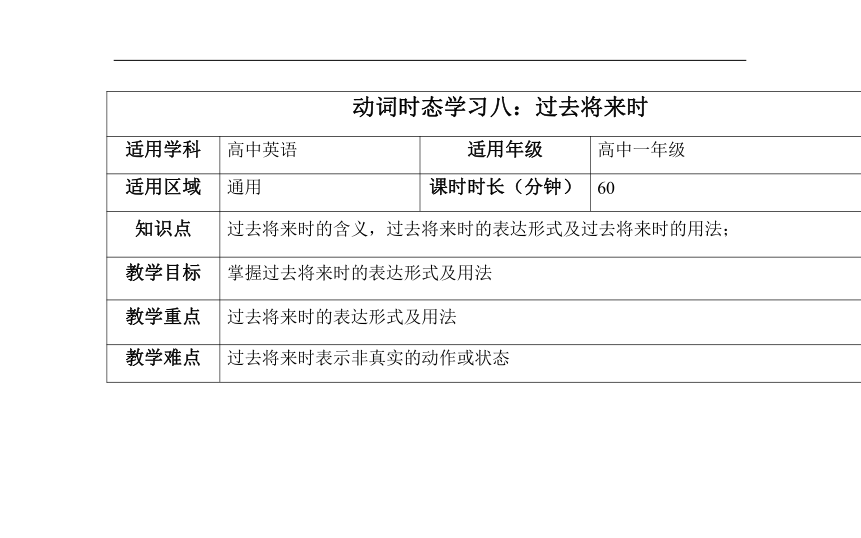 | |
| 格式 | docx | ||
| 文件大小 | 29.4KB | ||
| 资源类型 | 教案 | ||
| 版本资源 | 人教版(2019) | ||
| 科目 | 英语 | ||
| 更新时间 | 2022-09-26 06:49:50 | ||
图片预览

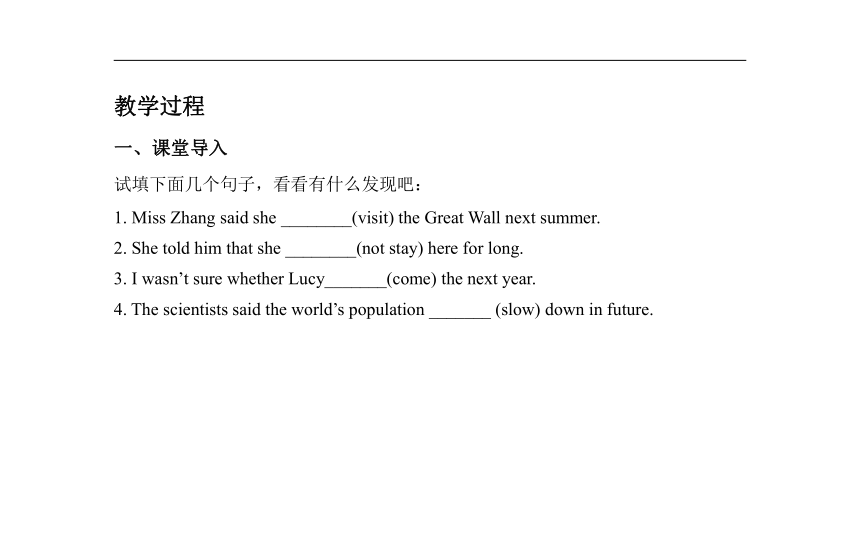
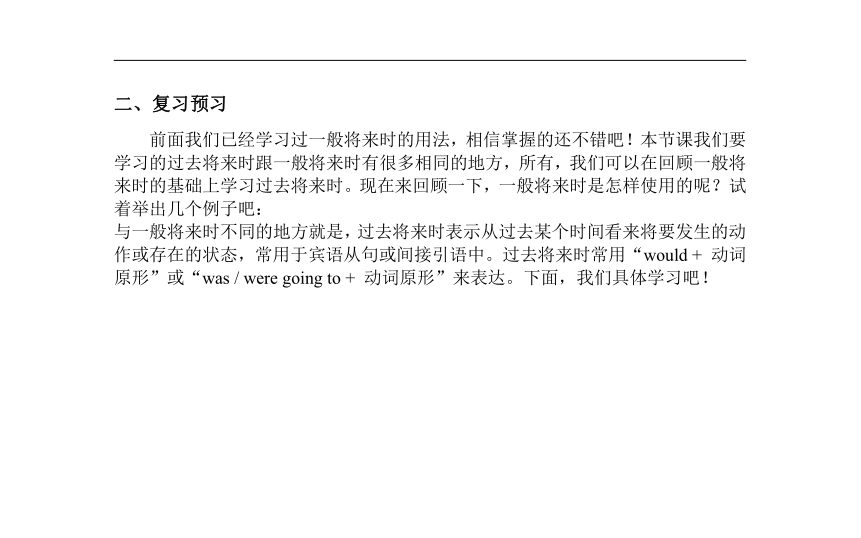
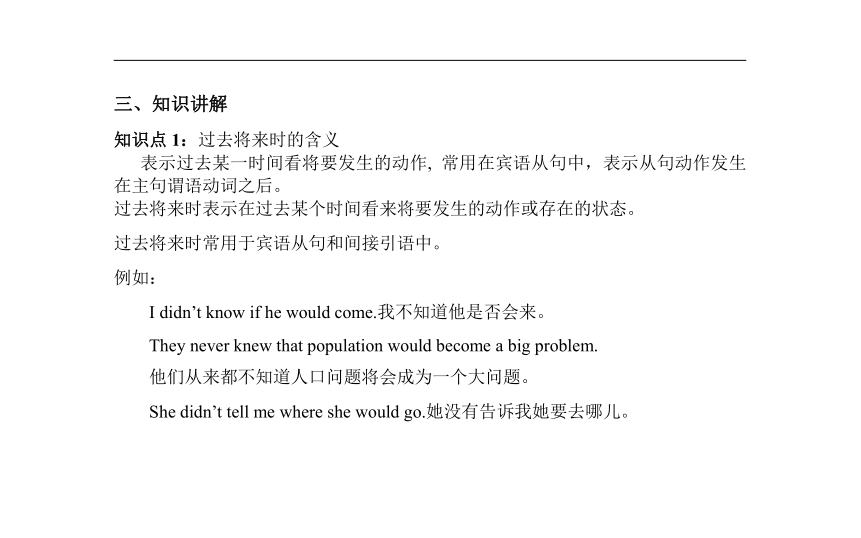
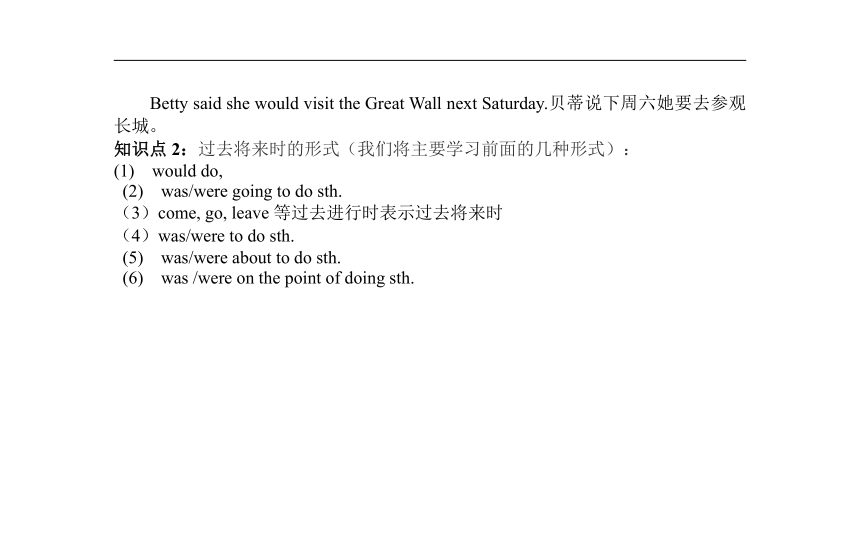
文档简介
动词时态学习八:过去将来时
适用学科 高中英语 适用年级 高中一年级
适用区域 通用 课时时长(分钟) 60
知识点 过去将来时的含义,过去将来时的表达形式及过去将来时的用法;
教学目标 掌握过去将来时的表达形式及用法
教学重点 过去将来时的表达形式及用法
教学难点 过去将来时表示非真实的动作或状态
教学过程
一、课堂导入
试填下面几个句子,看看有什么发现吧:
1. Miss Zhang said she ________(visit) the Great Wall next summer.
2. She told him that she ________(not stay) here for long.
3. I wasn’t sure whether Lucy_______(come) the next year.
4. The scientists said the world’s population _______ (slow) down in future.
二、复习预习
前面我们已经学习过一般将来时的用法,相信掌握的还不错吧!本节课我们要学习的过去将来时跟一般将来时有很多相同的地方,所有,我们可以在回顾一般将来时的基础上学习过去将来时。现在来回顾一下,一般将来时是怎样使用的呢?试着举出几个例子吧:
与一般将来时不同的地方就是,过去将来时表示从过去某个时间看来将要发生的动作或存在的状态,常用于宾语从句或间接引语中。过去将来时常用“would + 动词原形”或“was / were going to + 动词原形”来表达。下面,我们具体学习吧!
三、知识讲解
知识点1:过去将来时的含义
表示过去某一时间看将要发生的动作, 常用在宾语从句中,表示从句动作发生在主句谓语动词之后。
过去将来时表示在过去某个时间看来将要发生的动作或存在的状态。
过去将来时常用于宾语从句和间接引语中。
例如:
I didn’t know if he would come.我不知道他是否会来。
They never knew that population would become a big problem.
他们从来都不知道人口问题将会成为一个大问题。
She didn’t tell me where she would go.她没有告诉我她要去哪儿。
Betty said she would visit the Great Wall next Saturday.贝蒂说下周六她要去参观长城。
知识点2:过去将来时的形式(我们将主要学习前面的几种形式):
(1) would do,
(2) was/were going to do sth.
(3)come, go, leave等过去进行时表示过去将来时
(4)was/were to do sth.
(5) was/were about to do sth.
(6) was /were on the point of doing sth.
考点/易错点A ) would + 动词原形
例如:
He asked me if I would stay here.
他问我是否要待在这儿。
考点/易错点B ) was / were going to + 动词原形
例如:
No one knew when he was going to finish his homework.
没有人知道他什么时候会完成作业。
考点/易错点C ) was/ were ( about ) to + 动词原形
例如:
He said that they were to leave at six.
他说他们将于6点动身。
She said that the meeting was about to begin.
她说会议就要开始了。
考点/易错点D) come, go, arrive, leave, die 等瞬时动词,用在过去进行时态中表示过去将来。
例如:
She told us that she was leaving for Yunnan.
她告诉我们她将要去云南。
知识点3 过去将来时的表达法
考点/易错点1 “would+动词原形”。常表示按计划或安排即将发生的事。
例如:
He said he would come to see me.
他说他要来看我。
He told me he would go to Beijing.
他告诉我他将去北京。
考点/易错点2 “was/ were+going to+动词原形”。常可用来表示按计划或安排即将发生的事。
例如:
She said she was going to start off at once.
她说她将立即出发。
I was told that he was going to return home.
有人告诉我他准备回家。
此结构还可表示根据当时情况判断有可能但不一定会发生某事。例如:
It seemed as if it was going to rain.
看来好像要下雨。
考点/易错点3 come, go, leave, arrive, start等动词可用过去进行时代替过去将来时。
例如:
He said the train was leaving at six the next morning.
他说火车将于第二天早晨六点离开。
She told me she was coming to see me.
她告诉我她要来看我。
考点/易错点4 条件状语从句和时间状语从句中须用一般过去时代替过去将来时。
例如:
I didn’t know when she would come, but when she came I would let you know.
我不知道她什么时候来,但她来了我会告诉你。
The teacher said that it would be very difficult to make progress if I didn’t work hard.
老师说,如果我不努力学习的话,就很难取得进步。
考点/易错点5 主句为过去时,宾语从句常表示将要发生的事情。
例如:
Nobody knew what would happen after a hundred years.
没有人知道一百年之后将会发生什么事。
考点/易错点6过去将来时还可以用来表示非真实的动作或状态。
例如:
If I had a chance to study abroad, I would study at Harvard University.
如果我有机会出国学习的话,我就会去哈佛大学。
I wish he would go with me to the cinema tonight.
今晚他能和我一起去看电影就好了。
四、例题精析
【例题1】
【题干】 —What did your son say in the letter
—He told me that he ______ the Disney World the next day.
A. will visit B. has visited
C. is going to visit D. would visit
【答案】D
【解析】根据主句“told”可以知道,时态为过去.又从后面的 “the next day”知道为将来时,综合这两点,可以看出答案为D。
【例题2】
【题干】 ---Did you ask your pen pal _______
---Yes, he will visit Taiyuan after the exam.
A. what he will do B. when he would come C. how he would get here.
【答案】B
【解析】从主句did 可以看出来,是过去有没有问过。从答句又可以看出来是将来的时间。综合两者,应该用过去将来时,即B为正确答案。
【例题3】
【题干】If I had enough money, I ________ a big house for my father.
A. will buy B. would buy C. have bought D. am buying
【答案】B
【解析】从if从句可以看出,这是表示非真实的动作或状态,即,这是对现在情况的一种假设,所以主句应该用过去将来时。
课程小结
通过本节课的学习,我们知道过去将来时的基本特征,其实就是“立足过去,着眼未来”。它表示从过去某一时间来看将要发生的某个动作或存在的某种状态。在学习的过程中,一定要多举例,多练习,多总结,这样才能更好的掌握过去将来时的用法。
适用学科 高中英语 适用年级 高中一年级
适用区域 通用 课时时长(分钟) 60
知识点 过去将来时的含义,过去将来时的表达形式及过去将来时的用法;
教学目标 掌握过去将来时的表达形式及用法
教学重点 过去将来时的表达形式及用法
教学难点 过去将来时表示非真实的动作或状态
教学过程
一、课堂导入
试填下面几个句子,看看有什么发现吧:
1. Miss Zhang said she ________(visit) the Great Wall next summer.
2. She told him that she ________(not stay) here for long.
3. I wasn’t sure whether Lucy_______(come) the next year.
4. The scientists said the world’s population _______ (slow) down in future.
二、复习预习
前面我们已经学习过一般将来时的用法,相信掌握的还不错吧!本节课我们要学习的过去将来时跟一般将来时有很多相同的地方,所有,我们可以在回顾一般将来时的基础上学习过去将来时。现在来回顾一下,一般将来时是怎样使用的呢?试着举出几个例子吧:
与一般将来时不同的地方就是,过去将来时表示从过去某个时间看来将要发生的动作或存在的状态,常用于宾语从句或间接引语中。过去将来时常用“would + 动词原形”或“was / were going to + 动词原形”来表达。下面,我们具体学习吧!
三、知识讲解
知识点1:过去将来时的含义
表示过去某一时间看将要发生的动作, 常用在宾语从句中,表示从句动作发生在主句谓语动词之后。
过去将来时表示在过去某个时间看来将要发生的动作或存在的状态。
过去将来时常用于宾语从句和间接引语中。
例如:
I didn’t know if he would come.我不知道他是否会来。
They never knew that population would become a big problem.
他们从来都不知道人口问题将会成为一个大问题。
She didn’t tell me where she would go.她没有告诉我她要去哪儿。
Betty said she would visit the Great Wall next Saturday.贝蒂说下周六她要去参观长城。
知识点2:过去将来时的形式(我们将主要学习前面的几种形式):
(1) would do,
(2) was/were going to do sth.
(3)come, go, leave等过去进行时表示过去将来时
(4)was/were to do sth.
(5) was/were about to do sth.
(6) was /were on the point of doing sth.
考点/易错点A ) would + 动词原形
例如:
He asked me if I would stay here.
他问我是否要待在这儿。
考点/易错点B ) was / were going to + 动词原形
例如:
No one knew when he was going to finish his homework.
没有人知道他什么时候会完成作业。
考点/易错点C ) was/ were ( about ) to + 动词原形
例如:
He said that they were to leave at six.
他说他们将于6点动身。
She said that the meeting was about to begin.
她说会议就要开始了。
考点/易错点D) come, go, arrive, leave, die 等瞬时动词,用在过去进行时态中表示过去将来。
例如:
She told us that she was leaving for Yunnan.
她告诉我们她将要去云南。
知识点3 过去将来时的表达法
考点/易错点1 “would+动词原形”。常表示按计划或安排即将发生的事。
例如:
He said he would come to see me.
他说他要来看我。
He told me he would go to Beijing.
他告诉我他将去北京。
考点/易错点2 “was/ were+going to+动词原形”。常可用来表示按计划或安排即将发生的事。
例如:
She said she was going to start off at once.
她说她将立即出发。
I was told that he was going to return home.
有人告诉我他准备回家。
此结构还可表示根据当时情况判断有可能但不一定会发生某事。例如:
It seemed as if it was going to rain.
看来好像要下雨。
考点/易错点3 come, go, leave, arrive, start等动词可用过去进行时代替过去将来时。
例如:
He said the train was leaving at six the next morning.
他说火车将于第二天早晨六点离开。
She told me she was coming to see me.
她告诉我她要来看我。
考点/易错点4 条件状语从句和时间状语从句中须用一般过去时代替过去将来时。
例如:
I didn’t know when she would come, but when she came I would let you know.
我不知道她什么时候来,但她来了我会告诉你。
The teacher said that it would be very difficult to make progress if I didn’t work hard.
老师说,如果我不努力学习的话,就很难取得进步。
考点/易错点5 主句为过去时,宾语从句常表示将要发生的事情。
例如:
Nobody knew what would happen after a hundred years.
没有人知道一百年之后将会发生什么事。
考点/易错点6过去将来时还可以用来表示非真实的动作或状态。
例如:
If I had a chance to study abroad, I would study at Harvard University.
如果我有机会出国学习的话,我就会去哈佛大学。
I wish he would go with me to the cinema tonight.
今晚他能和我一起去看电影就好了。
四、例题精析
【例题1】
【题干】 —What did your son say in the letter
—He told me that he ______ the Disney World the next day.
A. will visit B. has visited
C. is going to visit D. would visit
【答案】D
【解析】根据主句“told”可以知道,时态为过去.又从后面的 “the next day”知道为将来时,综合这两点,可以看出答案为D。
【例题2】
【题干】 ---Did you ask your pen pal _______
---Yes, he will visit Taiyuan after the exam.
A. what he will do B. when he would come C. how he would get here.
【答案】B
【解析】从主句did 可以看出来,是过去有没有问过。从答句又可以看出来是将来的时间。综合两者,应该用过去将来时,即B为正确答案。
【例题3】
【题干】If I had enough money, I ________ a big house for my father.
A. will buy B. would buy C. have bought D. am buying
【答案】B
【解析】从if从句可以看出,这是表示非真实的动作或状态,即,这是对现在情况的一种假设,所以主句应该用过去将来时。
课程小结
通过本节课的学习,我们知道过去将来时的基本特征,其实就是“立足过去,着眼未来”。它表示从过去某一时间来看将要发生的某个动作或存在的某种状态。在学习的过程中,一定要多举例,多练习,多总结,这样才能更好的掌握过去将来时的用法。
同课章节目录
